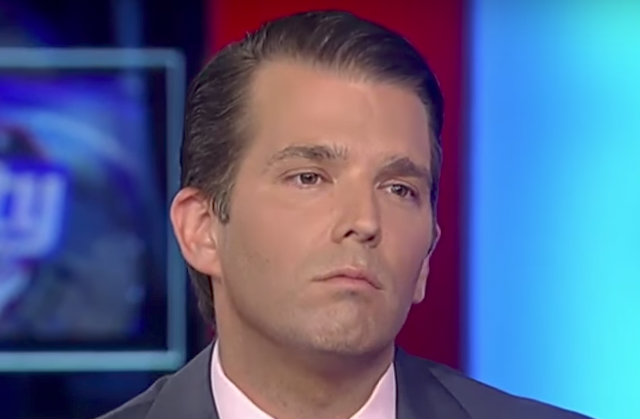 A report in The Atlantic Monday night featured Twitter exchanges between Donald Trump Jr. and WikiLeaks during President Donald Trump‘s campaign. The private messages were turned over to a congressional investigation by the younger Trump’s lawyers, and then posted online by Don Jr. himself. Now, a respected law professor believes they could be evidence that he broke the law.
A report in The Atlantic Monday night featured Twitter exchanges between Donald Trump Jr. and WikiLeaks during President Donald Trump‘s campaign. The private messages were turned over to a congressional investigation by the younger Trump’s lawyers, and then posted online by Don Jr. himself. Now, a respected law professor believes they could be evidence that he broke the law.
The messages include information that WikiLeaks gave to Trump Jr. about a website with the address putintrump.org. WikiLeaks said that the site was run by “a recycled pro-Iraq war PAC” that became an anti-Trump group.
“We have guessed the password,” WikiLeaks said. “It is ‘putintrump.’ See ‘About’ for who is behind it. Any comments?”
Trump Jr. later responded that he wasn’t familiar with the organization, “but I’ll ask around.”
Depending on what that asking around involved, the younger Trump may have broken the law, according to George Washington University Law Professor Orin Kerr, who is an expert in computer crime law and internet surveillance.
Kerr noted on Twitter Tuesday morning, “If DJT Jr. passed on the Twitter message that included the “putintrump” password with intent that others use the password, that’s a 18 USC 1030(a)(6) violation, right?”
If DJT Jr. passed on the Twitter message that included the “putintrump” password with intent that others use the password, that’s a 18 USC 1030(a)(6) violation, right? Traffics is just transferring, and affecting interstate commerce just means within the commerce clause power. pic.twitter.com/B7rN4929U6
— Orin Kerr (@OrinKerr) November 14, 2017
18 USC § 1030(a)(6) states that anyone who “knowingly and with intent to defraud traffics (as defined in section 1029) in any password or similar information through which a computer may be accessed without authorization, if … such trafficking affects interstate or foreign commerce,” is in violation. Kerr noted that the standard for affecting interstate or foreign commerce is extremely broad, as outlined by court decisions regarding the commerce clause of the Constitution.
So basically, the argument goes that if Donald Jr. gave the password to someone else, that would be considered trafficking. As far as having an “intent to defraud,” Kerr later said that all that’s needed is a “broader plan to use” it.
Presumably treated as identical to (a)(4), right? Which in turn, Czubinski says, requires some broader plan to use.
— Orin Kerr (@OrinKerr) November 14, 2017
In the same Twitter thread, attorney Aaron Williamson noted that if he used the password himself, that would be a violation of 18 USC § 1030.
I think you can get there more directly. The exchange suggests that the About page was, at the time, only accessible to authenticated users and Don Jr. logged in to view it.
— Aaron Williamson (@copiesofcopies) November 14, 2017
Of course, this whole thing might be a stretch. First, we don’t know if Trump Jr. gave the password to anyone. Kerr’s whole premise is based on a giant “if.” Sure, he told WikiLeaks he would look into the organization, but that doesn’t mean he did anything about it.
Williamson has a slightly better case, since it’s easier to imagine that Trump Jr. used to password to see what the site was about. He infers from the conversation that the site’s “About” page was password protected, but he doesn’t know for sure. Even if it is, that doesn’t mean that Donald accessed it. He could have just told WikiLeaks he didn’t know anything about it because he wanted nothing to do with what WikiLeaks was pushing.
Even if Trump Jr. did access the page, though, where is the evidence of a broader plan or other intent to defraud? There is none.
The revelation of the messages between Trump Jr. and WikiLeaks is interesting, no doubt. It could very well lead to evidence of illegal activity between the two, but so far we need more information to make an definitive claim.
[Image via Fox News screengrab]